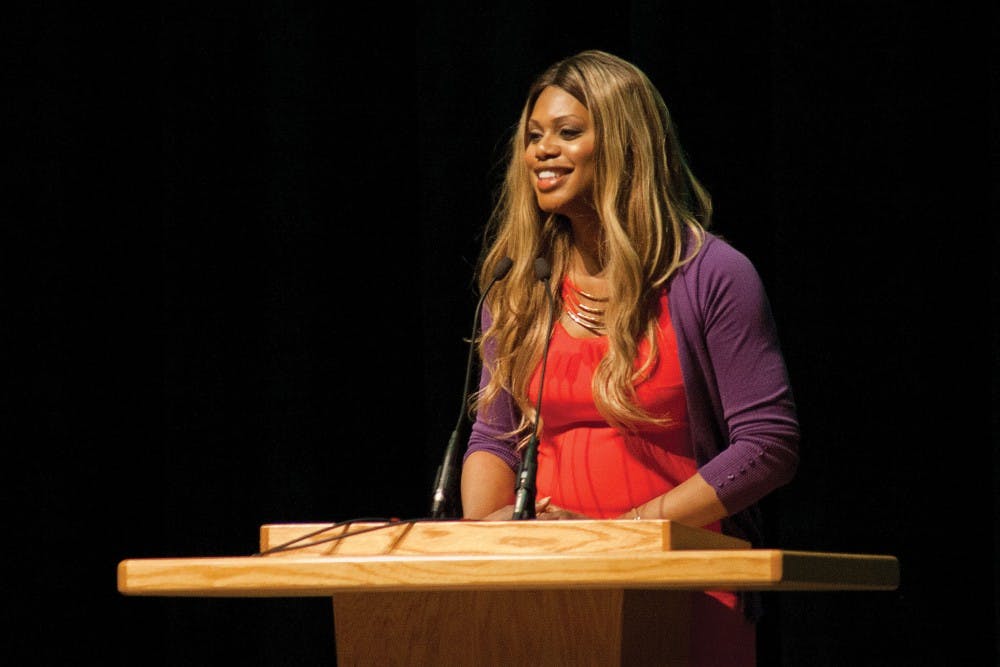Students lined up in the freezing temperatures for four hours to get front row seats to hear Emmy Award-nominated actress Laverne Cox speak Monday in John R. Emens Auditorium.
The actress, famous for her role in the Netflix series, “Orange is the New Black,” presented “Ain’t I A Woman: My Journey to Womanhood.” Nearly 1,900 people attended the event.
“We got here at 2 [p.m.] and scoped it out and there wasn’t a line, so we went and got lunch and coffee and came back and started the line,” said Meredith Twyman, a senior dietetics major who waited with Alicha Anderson, a senior criminal justice major.
Both Anderson and Twyman cited a recent cover of Time magazine featuring Cox. The article mentioned transgender becoming the next large-scale social issue after same-sex marriage.
“It’s sad that we are just now jumping off, but it’s a good jumping off point for equality and having that conversation, because I don’t think it’s being had right now,” Twyman said.
Cox shared stories from her childhood, admitting that even though she was born a male, she had a hard time hiding her femininity.
“Before I knew anything about myself, I knew I was black. In preschool, I was greeted by kids with words like 'sissy' and the 'f word' that I don’t like to say but is a synonym for ‘sissy,'" Cox said, discussing her difficult start in life.
School didn’t get any easier for Cox, whose third grade teacher called her mother to warn her that her son was “going to end up in New Orleans in a dress if [they] don’t get him into therapy.”
At a young age, Cox confided in her therapist that she didn’t believe there was any difference between being a boy and being a girl. At one point, there was discussion about injecting Cox with testosterone to make her more masculine.
“From a young age, I believed I was wrong,” she said.
In sixth grade, Cox attempted to commit suicide, swallowing an entire bottle of pills found in her medicine cabinet. When she woke up the next morning, she said she promised herself she would work at changing the attitudes of others that made her feel that way.
After entering college as gender nonconforming and experimenting with a more feminine appearance, Cox decided to transition into a woman with the help of surgery and hormonal drugs.
Though Cox felt like her gender and her sex were finally the same, not everyone received the change well. She said it took her mother several years to get used to calling her a different name and to understand that her son was now her daughter. Even complete strangers reacted poorly to her decision to transition.
“In 2008, I was walking around my neighborhood in midtown Manhattan and I walked passed group of men and they yelled anti-gay slurs, anti-transgender slurs,” Cox said. “One of them yelled, 'That’s a man!’ And the other one kicked me. Justice is what love looks like in public. That’s good, right?”
Despite her struggles socially, Cox said she had to learn to be comfortable with herself even when others weren’t.
“It took me many years to realize that if a person can look at me and tell I’m transgender, that’s okay because everything about being transgender is beautiful, and anything that is beautiful should be celebrated,” she said.
Before she came to the presentation, Nyesha Canady, a junior actuarial science major, had heard about Cox from her sister.
“My sister is always telling me about how powerful she is,” Canady said. “My sister is always standing up for the boys at school who are more feminine than people think they should be. She says [Cox] gives her the confidence to do that.”
Whether people were long-time fans or had just heard of Cox from others, Anderson said it seemed like the issue discussed was unifying for everyone in attendance.
“I think it’s brought a lot of different groups of people together,” Anderson said. “There’s a lot of people that identify with her and those who don’t identify with her together to talk about one subject.”





